In my letter to the editor last week addressing why the Brown County Sheriff’s race is a contest between two unendorsable Republicans, I summarized Sheriff Mark Milbrandt’s failure to properly address sexual harassment thus:
Sworn testimony in court last December from Milbrandt and from DCI agents indicate loyalty to a good-old-boys network that treats sexually offensive conduct as joking around that women shouldn’t complain about. Former DCI agent Laura Zylstra Kaiser was sexually harassed by two Brown County deputies; Sheriff Milbrandt punished neither of his deputies, and after the second complaint, he pushed DCI to get rid of Zylstra Kaiser [CAH, “Neither Milbrandt Nor Kaiser Gets My Endorsement for Brown County Sheriff,” letter to the editor published in Aberdeen American News, reprinted in Dakota Free Press, 2018.06.01].
To support this statement, let’s look at the testimony of Sheriff Milbrandt himself (pp. 591–630) in federal court on December 13, 2017, in the workplace retaliation case that won Zylstra Kaiser $1.5 million from Marty Jackley’s DCI.
The first noticeable characteristic is Sheriff Milbrandt’s deliberate vagueness and lack of memory about what one would think would be a pretty memorable accusation of sexual harassment against one of his deputies. Milbrandt’s responses to the plaintiff’s attorney, Lucas Kaster, are riddled with not sures (7), don’t knows (19) and don’t remembers (25).
Yet in October 2011, when Deputy Ross Erickson told Sheriff Milbrandt that DCI Agent Zylstra Kaiser was complaining about his sexually harassing comments, Milbrandt keenly remembered the complaint Zylstra Kaiser had made several years before about sexual harassment from another of his deputies, Brian Locke. In a conversation on November 2, 2011, with DCI investigator Nate Leuning, who was looking into the Zylstra Kaiser situation, Milbrandt specifically mentioned Zylstra Kaiser’s past complaint about Locke to emphasize that it was the second time Zylstra Kaiser had complained about sexual harassment from one of his people.
Milbrandt also remembered sufficiently well that he never really disciplined either Erickson or Locke:
Milbrandt defended his inaction against his sexually harassing deputies by creating a picture of Zylstra Kaiser as chronic drama queen:
- [Kaster] Q Actually on 11-20, you said, I want her gone, right?
- [Milbrandt] A Yeah, nothing could—nothing was getting done. It was just—I kept getting complaints from the agents.
- Q Not, I want the men transferred or demoted, I want her gone?
- A Yep.
- Q Right?
- A Yes, she was causing the problems.
- Q I’m going to put a no — not welcome sign on my door because of her, right?
- A I — yeah.
- Q Not because of any other male officers or agents, right?
- A Right.
- Q Because of her?
- A That they couldn’t work with her. She was the issue. That was just the working part. They had nothing to do with sexual harassment. It was they couldn’t work. So to me it was creating a hostile work environment. I had to do something.
- Q On October 20th, that’s how you felt about her?
- A I don’t remember what the date was.
- Q Well, on October 20th you said she’s not welcome here, I want her gone, right?
- A Yep, I guess that was the date.
- Q Two days after she confronted Mr. Erickson about harassment, right?
- A I — I guess it says that in there, but I know there was — I think there probably was problems that was before. I mean, it wasn’t just a two-day thing. They didn’t do anything.
- Q And then you tell Mr. Leuning you don’t trust her anymore, right?
- A I — if that’s what’s in there, I must have.
- Q Well, you look at it. Is it in there?
- A Yeah, that’s what he put down. I’m just done with her [emphasis mine; pp. 625–626].
Milbrandt blames Zylstra Kaiser for “creating a hostile work environment” by lying about sexual harassment, even though he sought no proof that she lied beyond the denials of the accused and can’t even tell the court what lie she told:
- Q In fact, you believe it is her who created a hostile work environment, right?
- A I believe it was a — a situation where she wouldn’t work with people, and they came and reported to me that she lied to them, and they couldn’t work with her anymore. I didn’t know what other choice I had but to call DCI and let them know.
- Q What was the lie?
- A I don’t know what the lies were. It was — when Agent Black came in — it’s been so long ago — but he just spilled his gut. He was mad. And I went and talked to the other agents and they just couldn’t trust her. I don’t know what the lie was about. It was either she wasn’t going to do this or do that. I don’t know what it was. You’d have to ask him.
- Q Did you ever know what the lie apparently was?
- A You know, I’m not sure what it was, no.
- Q Did you ever know if in fact she did lie?
- A Well, I think it had to do with she was testing somebody or something. Was testing Black or testing Ross. I’m not sure. You know, I don’t remember that part of it.
- Q About what?
- A I don’t know. I think it was the — something she said or they said. And then they couldn’t get along well because she lied to me and I told this and that. And I finally figured out that nobody was working together. That’s why I called DCI to take care of it. She wasn’t my employee.
- Q Did you think it might be important to figure out if somebody, for example, Ms. Kaiser, actually did lie before you would form an opinion?
- A I figured that’s what DCI would do when they checked into their employ — their employee [pp. 614–615].
Sheriff Milbrandt never asked Zylstra Kaiser herself what happened.
Not only does Milbrandt blame the victim of sexual harassment for making trouble in the office, and not only does her call the victim a liar because the accuser says she’s a liar, but Milbrandt excuses a clear incident of sexual harassment as normal workplace behavior. In 2005, Deputy Locke subjected Agent Zylstra Kaiser to ongoing harassment, including comments that women belong in the kitchen and that the only reason informants would talk to her was her boobs. Milbrandt says that latter comment isn’t sexual harassment:
- Q Do you also specifically say to Mr. Leuning in this report that it is your belief that Mr. Locke’s comments to Ms. Kaiser were not sexual harassment, right?
- A I don’t believe I put it that way, no.
- Q Well, let’s look at Exhibit 24.
- A Okay.
- Q Second to last sentence of the first paragraph. Milbrandt did not think what Locke said constituted sexual harassment. After the incident with Locke, things deteriorated.
- A Yes. I remember why I said that is because we all work together — or they worked together and I find that when you have a co-worker, you kid, you tease, and it’s just a comment that he made is what I took it as. It was — didn’t mean nothing as a sexual harassment thing, just hey, you do this because you got — you know, and okay. That’s what happens when you work together. You say things.
- Q Then you say, And then she — things deteriorated. Right?
- A Yeah. I mean, I don’t think he, you know, didn’t want to really work with her anymore.
- Q After she complained about his comment?
- A I believe so, yes.
- Q So if Ms. Kaiser hadn’t complained, things wouldn’t have deteriorated, in your view?
- A Well, I don’t think they were getting along anyway, if I remember. They just — it wasn’t working.
- Q Potentially because he was harassing her?
- A I don’t think he was harassing her.
- Q Do you think — do you think the comments he was making to her were appropriate in the workplace?
- A You know, it’s one of those things when you’re working and say things, it just simply, yeah, you get more confessions because of this. Yeah, I didn’t personally didn’t think it was a big deal. I’m sorry.
- Q You mean him telling her you get more confessions because of your boobs?
- A I just thought it was an off the wall comment. I don’t think it was sexual harassment.
- Q It was funny?
- A I think he was trying to make it funny, yes [emphasis mine; pp. 611–613].
I am alarmed that I have to explain this to my sheriff or to any adult, but there is no normal, healthy workplace situation in which referring to a coworker’s “boobs” is or should be “what happens when you work together.” Such a reference is not funny; it is not not a big deal; it is sexual harassment. If Mark Milbrandt doesn’t get that after 24 years as Brown County Sheriff, maybe there’s no way to get him to get that. Even voting him out today and replacing him with the husband of the DCI agent whom his deputies sexually harassed might not teach him that lesson.
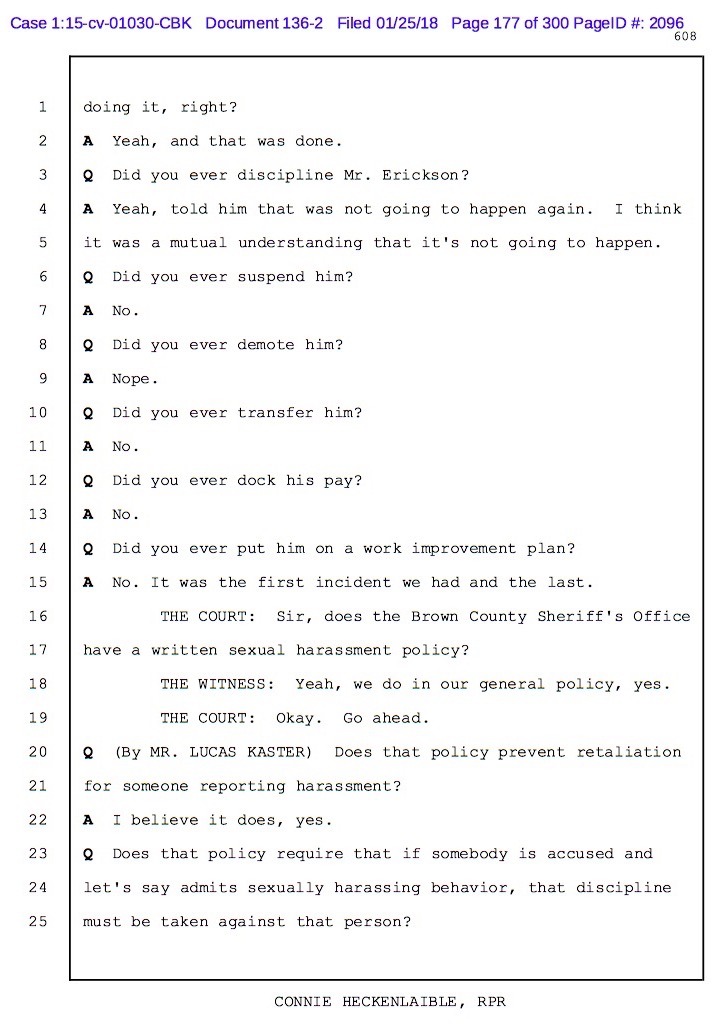
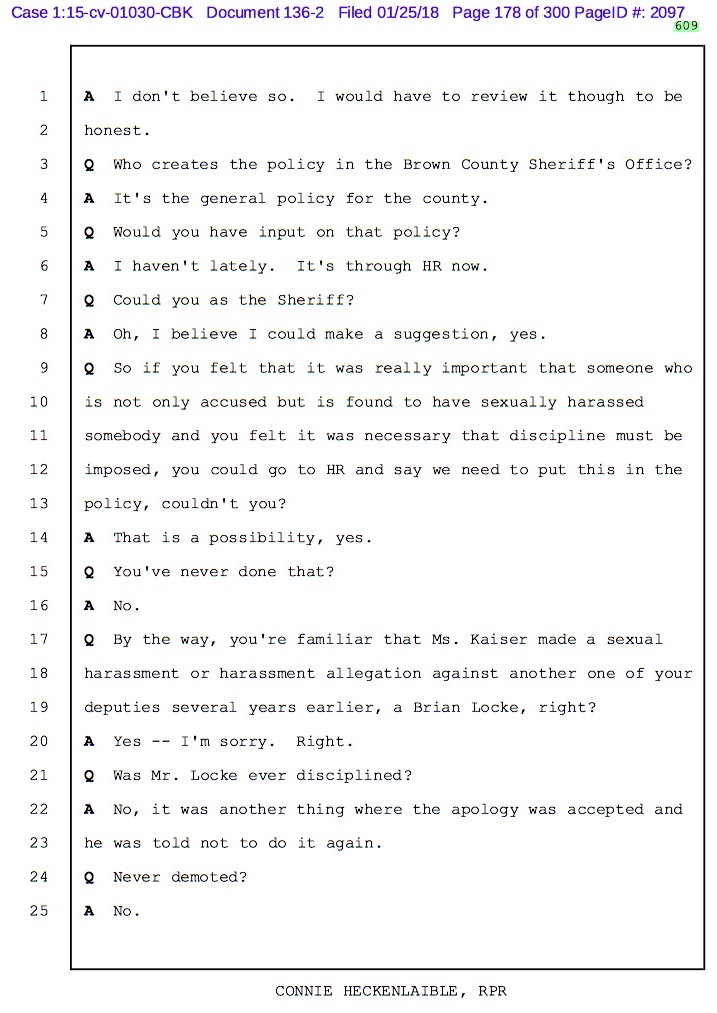
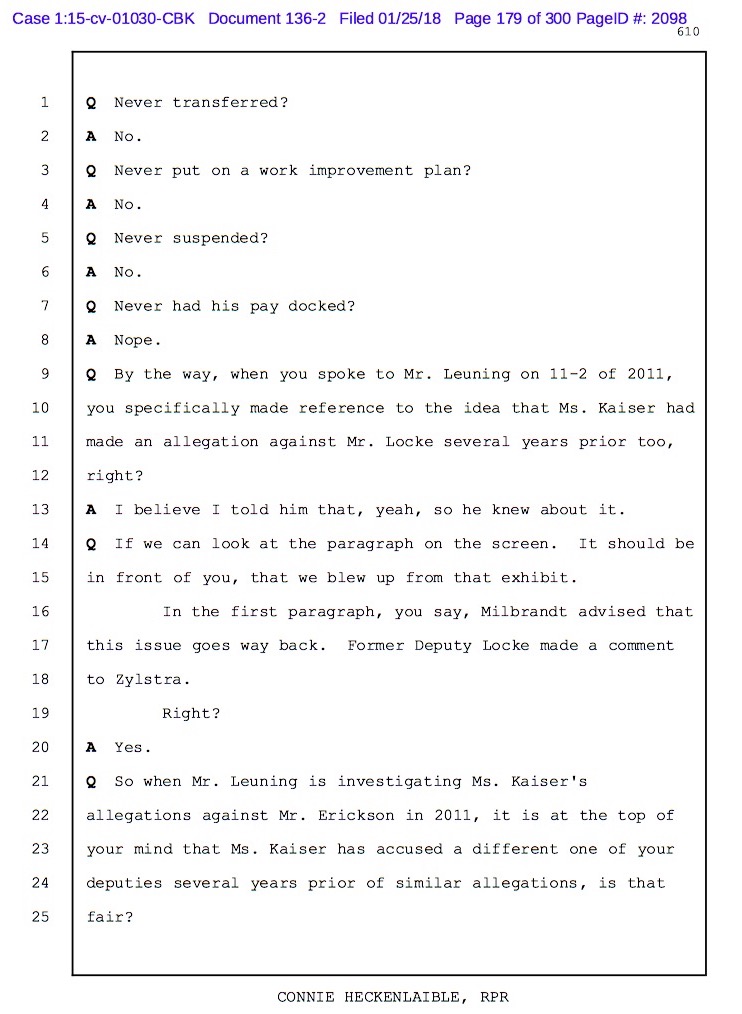

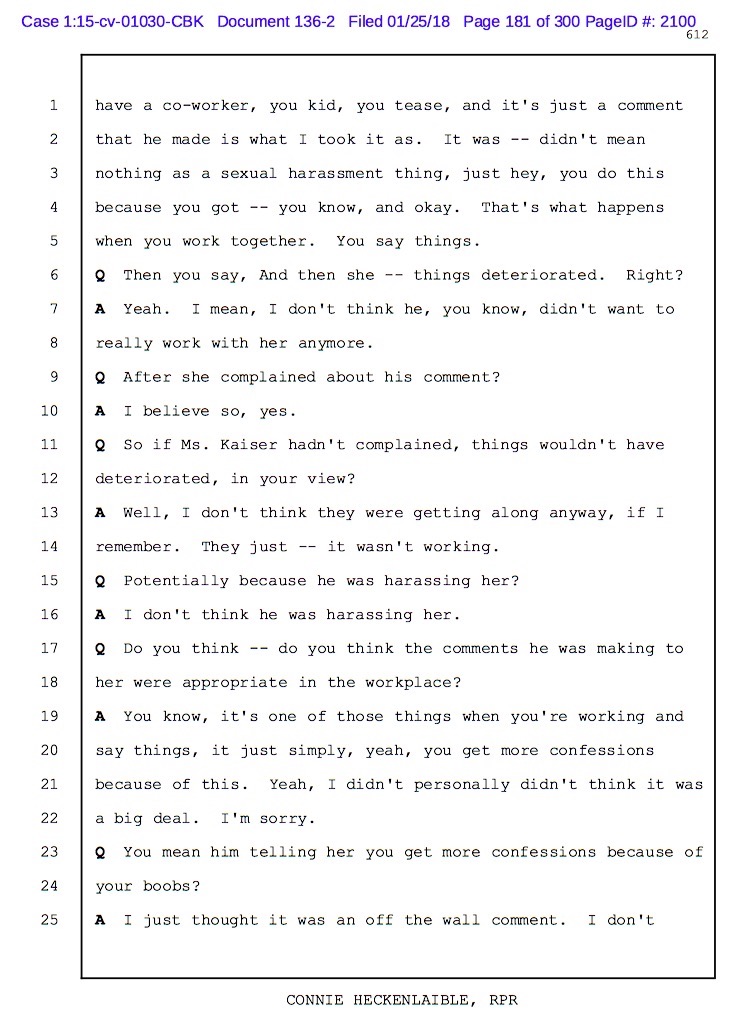
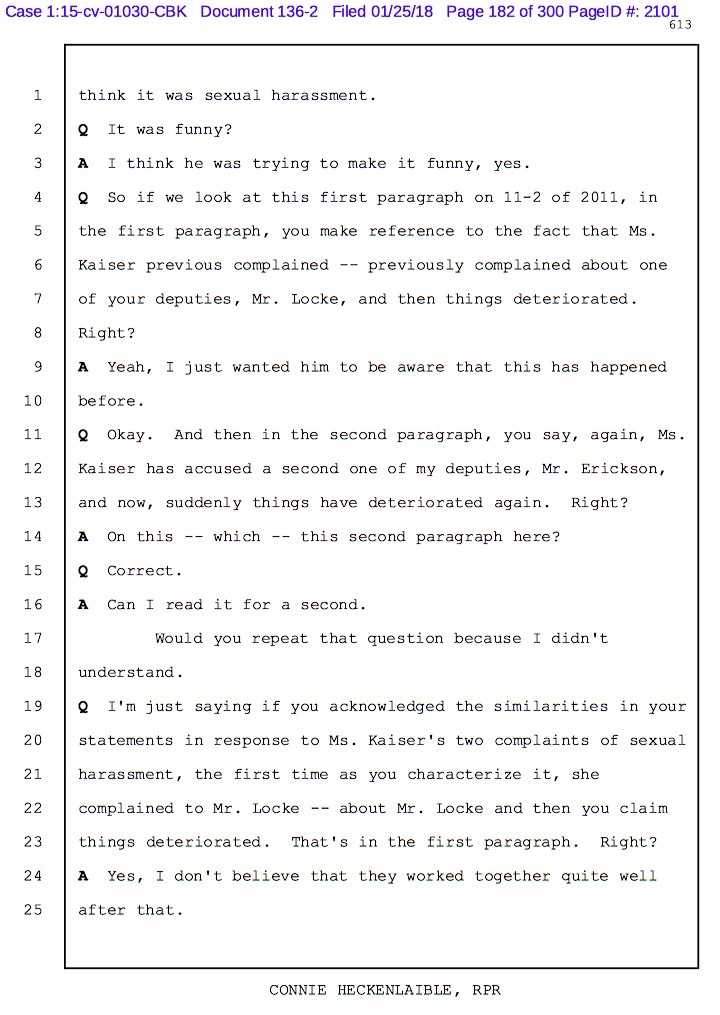
If I would have had the court transcripts for this cowardice during session? I would have brought legislation calling for the immediate and permanent loss of LE certification for all those involved, who condoned this, who covered it up, and who retaliated against DCI Agent Kaiser. They are an embarrassment to my profession and unfit to wear a badge.
Great post, Cory. You might have done more good by publishing it sooner, but at least it’s out there now, regardless of who comes out on top in the race for sheriff.
Thanks Cory for shining even more light on this. Holy cow, this is unbelievable. (Thank goodness the good folks on an Aberdeen jury found it VERY believable)
Senator Nelson, thank you for your comments. Can’t be said any better than you did. It IS a disgrace to the badge, one that I also wore for 25+ years. This is horrible and someone who gave tacit approval to this conduct, should be no where near the office of the sheriff. Those that committed this harassment, also shouldn’t be wearing a badge.
I’m struggling to find what ultimate good comes out of my local sheriff’s election. Regardless of the outcome, Brown County will be stuck with a sheriff with at least one serious moral deficiency.
This is outrageous. That bastard. That collection of bastards. That’s one of the worst examples of a “boys club” and it’s heartening to hear men here who find that conduct reprehensible. What can be done now about not only Milbrandt, but the other “good old boys” who were part of that shameful behavior?
“Outrageous”. “Bastard”. Why haven’t I heard that language about this situation around town more?
Boys club: I’m sorry to say, Debbo, that you are spot on. Testimony from DCI agents in the trial make even clearer the reflexive good-old-boys response to LZK’s complaint. It’s really appalling. I will spend more time highlighting this pattern of patriarchy and misogyny in future blog posts.
What can be done? If Dan Kaiser doesn’t win tonight, elect Laura Zylstra Kaiser as sheriff in 2022.
#teammilbrandt for the win!!!! Maybe there is more to the story eh? Isn’t in the transcript that Laura Kaiser liked to talk about her preference of underwear? Called the other deputies wives names? An old case of what’s good for the goose isn’t good for the gander??? Maybe one of these days, the Kaisers will quit embellishing their stories…..
From what I’ve read in the transcript, “Greg”, I don’t see evidence that LZK “liked to talk” about her underwear. I see one mention where responded to one sexually harassing text from Deputy Erickson with one word—”black”, the color of her underwear that Erickson had inappropriately asked about—hoping to get him off her back. I haven’t gotten to the part about calling other women names yet, but Greg, tell me: if your wife calls my wife a name, does that mean I get to proposition your wife?
If there is more to the story, “Greg”, please provide the documents proving it, not your wishful innuendo. In this story, I’ve looked strictly at the text on the record, text that convinced a jury that the DCI retaliated against LZK for complaining about sexual harassment, and text that makes Sheriff Milbrandt look indisputably bad.
Note also that “Greg”‘s exclamation point on win shows that he comes at this issue with a bias toward one candidate. I favored neither candidate. My analysis is thus more objective than Greg’s.